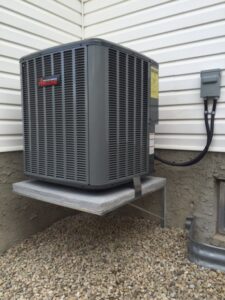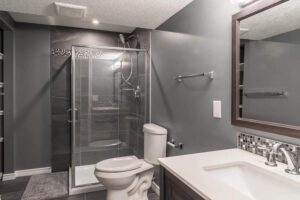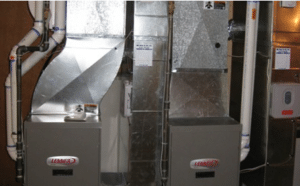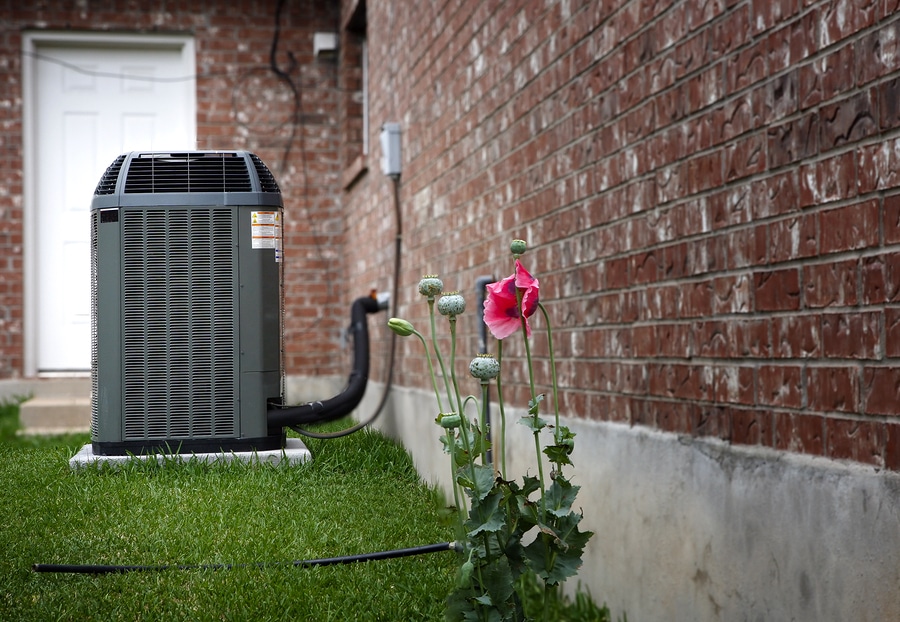
When the temperature’s rise and you are heating up, nothing feels better than coming into a nice cool house. Central air conditioners used to be a luxury item for homeowners, but now it comes standard in most new homes. Most older homes have it installed too, as it can be conveniently retrofitted to your existing HVAC system.

Table of Contents
ToggleTypes of air conditioners.
There are a few types of air conditioners you might find in a Canadian home. While central air conditioners are the most common, they are not your only option. Here is information on central air conditioners as well as other options:
Central air conditioner:
HVAC companies will use your existing furnace ducts to move cool air from the main AC unit outside to every room in your home. Working like a refrigerator, your central AC will pull in the hot air using a fan. Then refrigerant moving from the compressor coil to the evaporator coil will absorb the heat from the air. Once it’s cool, it gets pushed back through the duct work to cool the home.
Ductless air conditioners:
Ductless AC units are probably the most common type of air conditioners after central air. These can be installed without having an evasive renovation to your heating and cooling system. They are a smaller, rectangular appliance that hangs on the wall near the ceiling. The units are mounted to the wall and connected to an outdoor unit. With ductless air conditioners, you can have them cool only the rooms you have them in. With central AC, you must have every room in the house the same temperature. In some cases, this makes ductless air conditioners more energy efficient.
Window AC units:
These are the air conditioners you see installed in windows. They’re installed and sealed within an open window. They only cool the room they are in and are not the most efficient. These units can be used as a temporary option but are not highly recommended by HVAC companies.
Portable units:
A portable air conditioning unit is a good idea for your cottage or even workshop if it gets too hot in there. You can get them from a big box hardware store. Simply plug them in the wall outlet and away you go. They aren’t that powerful or efficient, so you wouldn’t want them as your permanent solution.
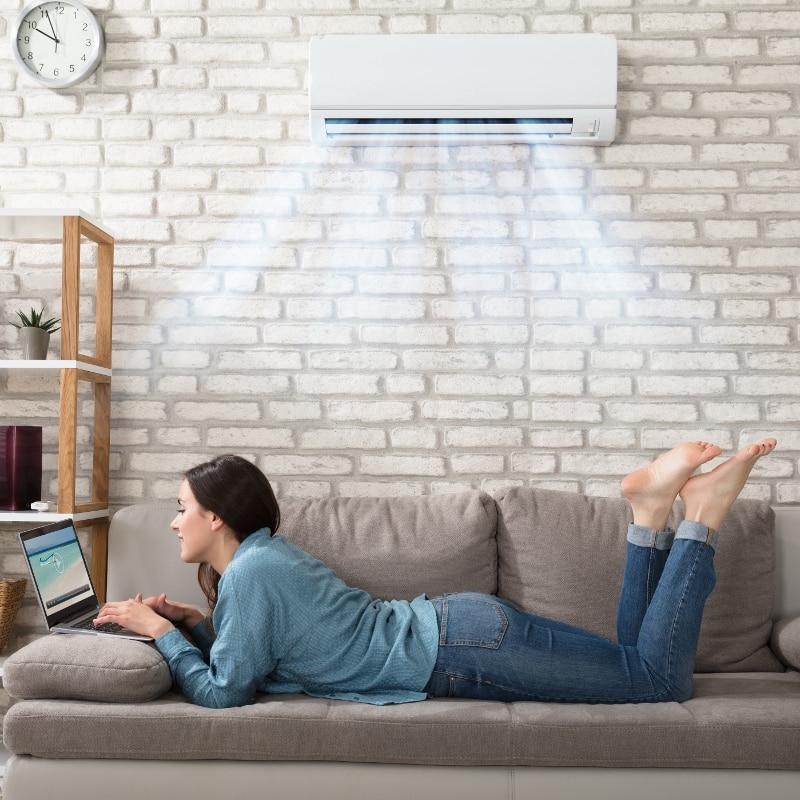
How cost is determined with central air conditioners:
The main things that will determine the cost of your air conditioner include the manufacturer, size of AC unit, complexity of the installation and where you live. You should also consider the on-going electricity and maintenance costs of owning an AC unit.
Brands and manufacturers:
There are generally three types of air conditioners offered by major manufacturers: economy, middle-of-the-road and high-end. Like any product you buy, the brand you choose will fall under one of these categories.
Economy brands and prices: You can still get good products in the economy brands, but they won’t offer the same energy efficiency or longevity. These brands include York, Goodman and Keeprite. Expect to pay $2,800 to $3,800. If you’re paying less than $3,000, be careful. You can get a decent air conditioner in this price category, but you run a higher risk of getting a low-quality unit. Do your research on the specific brand and model before you buy it.
Middle-range brands and prices: The middle-of-the-road brands make up the bulk of what’s available on the market, and just as the category name suggests, you’ll get mid-range pricing. These brands offer more in terms of features and a higher SEER rating. Brands in this category include Amana, Bryant, Rheem, Trane, Napoleon and American Standard. They range from $3,000 to $4,500.
High-end brands and prices: For the high-end brands, expect to pay more. Hopefully that manufacturer will live up to its premium reputation. They have a higher SEER rating, and better performance when it comes to durability and cooling. Brands in this range include Lennox and Carrier. Expect to pay between $3,500 to $6,000.
When it comes to AC, size matters.
Small, medium and large homes all require different output from their central air conditioning units. The bigger the home, the bigger air conditioner unit you’ll need. This where a professional HVAC company can help. They will visit your home and help you choose the correct type and size of air conditioner for your space. If you do not install an AC unit that is appropriate for your home’s size, it will struggle to maintain the cool temperature you want. It will not run efficiently, and this will drive up your monthly electricity costs.
The economy, mid-range or high-end brand you choose will vary in price, depending on the size of that specific brand’s unit you need. That, along with installation considerations, is why there is such a wide price range in the cost estimates provided above.
What needs to be done during installation.
Because your new air conditioner will be installed using your current duct work, installation costs will vary. Your ducts might need a renovation, depending on their layout and age, to accommodate the new AC. The more complicated the renovation, the more time it will take, the more installation will cost.
Most air conditioning companies will offer installation built into their product pricing. If you wanted to separate it, you can assume that $500 to $1,000 of your total cost is for labour and installation. This cost is not something you want to skip out on. Having your air conditioner installed by a professional, experienced and certified HVAC technician will make sure it’s done properly.
Why hire a professional HVAC company to install my air conditioner? They have the experience and knowledge to do it right AND make sure the right size of AC unit is installed. Get the size wrong and your home will not be cooled efficiently. That means you’ll pay more in electricity every summer. Furthermore, HVAC companies will have insurance, licensing, permits and all the tools and equipment to get the job done. This is not something you want to DIY.
Where you live and the company you choose.
Surprisingly, we learned that where you live in Canada can have a small impact on the cost of central air conditioning. This could be because of the economy, demand for AC in specific areas and the HVAC companies that serve those communities. These rough cost estimates came from Furnace Prices.
Alberta: $3,200 to $4,500. The cost seems to rise in rural Alberta.
Manitoba: $3,200 to $4,200 for a high-efficiency central air conditioner.
Ontario: $2,500 to $5,000 for a mid-range to premium air conditioner.
Saskatchewan: $3,000 to $4,200 for a high-efficiency AC.
Other parts of Canada: $3,000 to $5,000
All air conditioning companies will have varying prices on central air conditioning, no matter where you live in Canada. There pricing will depend on the brands and models they offer, experience of their HVAC technicians, size of company and the local market.
Never hire a company that gives you a quote that is substantially lower than the other quotes you receive. The cost can be a little lower, but still competitive with other HVAC contractors in your city. Low pricing could mean poor-quality products and lack of experience from the company. You want to spend a little more money now to ensure your new air conditioner is running at peak performance, longer.
Consider the on-going cost of central air conditioning.
Before choosing to have the air conditioner installed, you should consider the cost of owning and operating central air conditioning. The on-going cost for energy and regular maintenance is a factor. You should have room in your budget for annual service as well as the higher electricity bills in the warmer months.
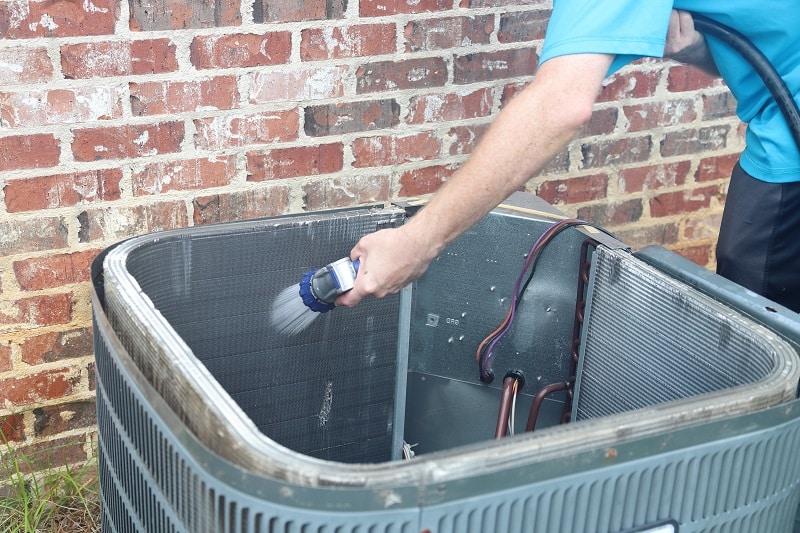
Maintenance:
Because summer is short in most parts of the country, you won’t have to worry about paying to run the AC year-round. Typically, homeowners run their air conditioning units from June into September. However, you will need to pay for an annual inspection and tune up service, ranging from $100 to $300 depending on the HVAC company. Regular maintenance of your air conditioner will ensure it runs more efficiently and will prevent costly breakdowns. All in all, this low annual cost will save you money in the long run.
Energy:
Now let’s talk energy costs. Running your air conditioner requires electricity, so that will add to your regular monthly energy costs. How much you’ll spend on your monthly bills running central air conditioning will depend on several things. These include the size of your home, how cold you want your house, how often and how long you run it, how insulated your home is and the efficiency level of your AC unit. Obviously, the weather also impacts your energy use. The hotter the summer, the more you’ll use the AC, the more you’ll pay. Homeowners pay between $300 to over $1,000 to run their air conditioner each year. This estimate includes maintenance costs.
If you want to reduce energy use, make sure other systems in your home are offering good thermal performance. Upgrading your attic insulation and ensuring windows are properly sealed will help you keep the heat out and that cool air in.
You should also get a programmable thermostat, so you aren’t running the air conditioning while you’re at work or away from the home. Instead of keeping the house icy cold, compromise with a comfortable cool temperature. Even going down a degree or two can add up in energy savings.
As mentioned, never neglect servicing your air conditioner. A good cleaning and tune up can really improve energy efficiency. The less strain on your air conditioner, the less you’ll pay in electricity to keep it running.
Look for the ENERGY STAR label. Choosing an ENERGY STAR certified air conditioner will ensure you’re getting a unit with a good SEER rating. They can run on 8% less than other AC units. The more energy efficient the unit, the better it is going to be for your bank account.
Choosing an air conditioning contractor.
Choosing the right HVAC company to do the job is just as important as choosing the make and model of your air conditioner. Just like any home improvement project, you want to make sure the contractor is knowledgeable, experienced and trustworthy. Choosing an air conditioning company might seem like a challenging task, so here are some pointers:
Get recommendations:
The best first place to start is within your own network. Ask your family and friends if they have a trusted HVAC company they typically use. Then make a shortlist of those recommended. If you can muster up a list from your personal network, check online and look for companies that are certified by an organization like RenovationFind. Having third-party accreditation can give you peace of mind knowing they’re operating to a set of standards.
Make some phone calls:
Start calling the companies on your list. Don’t be afraid to ask them lots of questions. Explain your project, ask for references, what their experience is, what models of air conditioners they offer and if they offer in-home assessments. Because choosing the right size of AC is important, you want the technician to visit your home.
Make sure they are licensed and insured:
Don’t hire an air conditioning contractor, or any contractor for that matter, that does not carry a proper business license. They should also have liability insurance and WCB coverage. If they don’t, they’re not the company for you.
Ask lots of questions:
You don’t want to be surprised, so ask as many questions as you can. Ask about brands, manufacturers, installation costs, the experience of their technicians and about their warranty coverage. A reputable air conditioning company will have no problem answering your questions and with any renovation, communication with your contractor is key.
Get everything in writing:
Be wary of any contractor that doesn’t provide you with a detailed estimate and/or contract in writing. This contract should include all aspects of the job including the type, size and brand of air conditioner, installation and cost of permits.
You can have more than one HVAC company visit your home and give you an accurate estimate for your project. They will have to see your home to determine what kind of renovation your ducts might require and the size of the AC unit that will best and most efficiently cool the home. This will give you a chance to meet the representative of the company, or the HVAC technicians themselves. Go with your gut. If they give you an uneasy feeling, hire someone you’re comfortable with and can trust.
Find a RenovationFind Certified air conditioning companies in your city!

